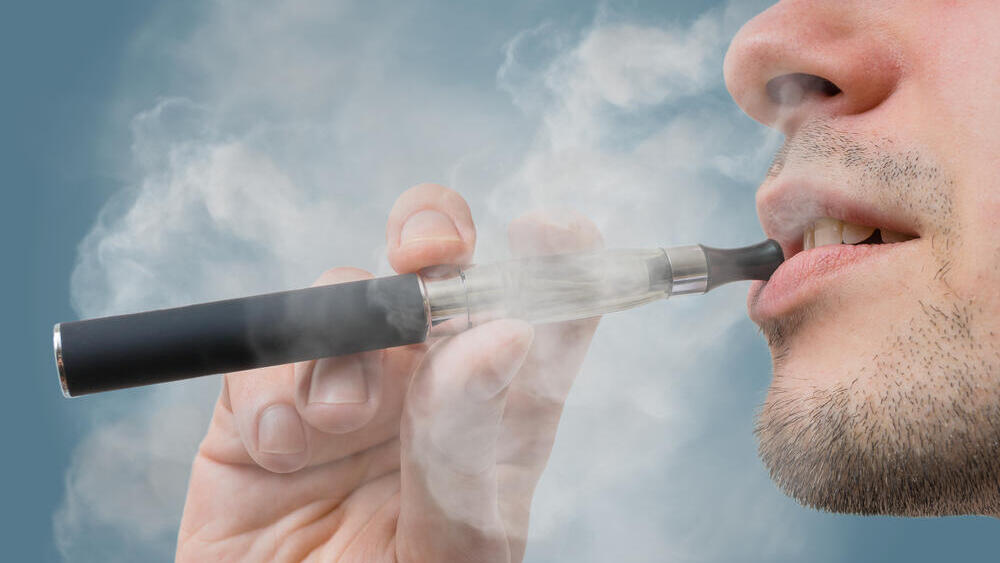Getting your Trinity Audio player ready...
Smoking causes 8,000 deaths annually in Israel, with 10% of cases resulting from passive smoking. The life expectancy of a smoker is at least 10 years less than that of a non-smoker. According to data from the Maccabi Health Services HMO, the rate of smokers in Israel stood at 20% of the total population as of 2022. Since October 7, various surveys have indicated that this rate is increasing.
Dr. Emilia Hardak, a pulmonary disease specialist in Maccabi Health Services’ northern district and the head of the pulmonary unit at Bnai Zion Medical Center, said, "Smoking takes a toll on the health system. A toll that starts at a young age, as early as school age."
According to her, "despite all the information available, the number of people smoking is increasing. The first wave was seen during the COVID-19 pandemic and is resurfacing now. People are looking for a way to relax, and more and more people who quit smoking in the past have returned to their old habits. We must do all we can to stop it." About 15% of all those affected by smoking have suffered from secondhand smoke.
Dr. Hardak explained a direct and strong link is seen between smoking and lung cancer, which causes about 90% of all lung cancer deaths. Among women, the mortality rate from lung cancer is higher than that of breast cancer. It’s estimated that 85% of all lung cancer cases could have been avoided by quitting smoking cigarettes.
One cigarette contains over 4,000 different toxins, 80 of which are considered carcinogens. Over the years, extensive knowledge has been accumulated linking smoking to lung cancer, but research also links cigarettes to other types of cancer such as esophageal cancer, throat cancer, bladder cancer, leukemia, kidney cancer, and more. One in three cancer cases comes as a result of cigarette smoking.
Smoking increases the risk of developing skin cancer by up to four times. Smokers have a much higher incidence of pre-cancerous cells known as solar keratosis, which are rough, reddish patches on facial skin. Smoking among men increases the likelihood of impotence.
The younger the age at which smokers begin to use cigarettes, the more severe the problem becomes, with a direct relationship between the severity of the condition and the amount of smoking.
Smokers at age 40 are three times more likely to suffer from impotence compared to non-smokers at age 50. Smoking women are more likely to suffer from human papillomavirus (HPV) infections and are at four times higher risk of developing vaginal warts compared to non-smokers.
Smoking is also a cause of diabetes. It affects the body's cells, causes inflammation, and disrupts the response to insulin. This increases the likelihood of developing diabetes and is especially dangerous to those already suffering from the disease. Smoking increases the risk of Alzheimer's disease, which leads to dementia, by 150%, and also increases the risk of vascular dementia by 170%.
Smoking increases the risk of dental problems, including gum disease and cancer. A U.S. study found that smokers have up to six times higher risk of gum disease, which can lead to tooth decay.
Smoking a pack of cigarettes daily for ten years increases the risk of developing psoriasis, an autoimmune disease, by 20% compared to non-smokers. Smoking a similar amount of cigarettes for 11 years or more doubles the risk. Smoking can worsen the condition of those already suffering from chronic diseases.
Smoking increases the risk of cataracts by 22%. Smokers are likely to develop the disease at an earlier age, and it is expected to be more severe.
Dr. Hardak explained that stress and anxiety, feelings of loneliness, and attempts to escape reality — which have been very noticeable in Israel since October 7 — have increased smoking among the population.
"Furthermore, this period has been characterized by job uncertainty and breaks from various activities, which has led many to use their free time to smoke cigarettes. Given this context and familiar comments on the matter such as 'a cigarette helps to calm me down,' it’s easy to understand the increase in cigarette consumption during this period."
Do electronic cigarettes have the same risk factors as regular ones?
Dr. Hardak: "Electronic cigarettes are marketed as a 'safer' and 'healthier' alternative to traditional cigarettes, but it turns out there are short-term and long-term damages caused by their use.
“Firstly, the simulated smoke generated in the vaping process is primarily composed of propylene, glycol, and glycerol, the addictive and harmful substances like volatile organic compounds, flavor and aroma substances, and chemicals, as well as nicotine, which is a dangerous and addictive substance that can cause an increase in blood pressure, heart rate, damage to blood vessels, and increase the risk of heart attack and stroke,” she explained.
 Dr. Emilia Hardak
Dr. Emilia Hardak"Nicotine is a central component in electronic cigarettes, and as such, it doesn’t facilitate the process of quitting smoking; it may even hinder the process. This addictive substance continues to affect the bodies of electronic cigarette users, harming their respiratory and vascular systems, among other things,” Dr. Hardak added.
“Electronic cigarette smokers may suffer from 'vaping-associated lung disease,' a respiratory condition that can deteriorate to respiratory failure due to vaping. The list of chemicals present in them includes formaldehyde, acetone, benzaldehyde, and other substances."





